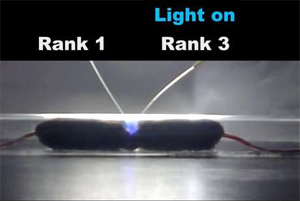Wednesday, 7 March 2018
“Winner effect” Makes Subordinate Mice Dominant

This week I’d like to tell you about an experiment by Hailan Hu and his team at Zhejiang University, in China. These researchers used optogenetic methods and various wavelengths of light to excite or inhibit, on command, a particular population of neurons in the dorsomedial prefrontal cortex (dmPFC) of mice. (These neurons receive their natural inputs from the mediodorsal portion of the thalamus.) When the researchers excited these neurons in previously subordinate mice, they began to win confrontations with previously dominant mice, forcing them to retreat in a tube resembling a narrow tunnel (see photo above) and let them pass first.
Even more surprisingly, experiencing these victories seemed to leave a lasting positive trace in the brains of the mice, even when they were no longer receiving optogenetic stimulation. For example, they were more combative in another experimental situation in which they fought for control of the warm corner of a cage with a cold floor.
Some of these mice returned to their original rank in the hierarchy after the original experiment, but others maintained the dominant position that they had gained from the victories that optogenetic stimulation had provided. This “winner effect”, as the scientists call it, evokes sayings such as “fake it ’til you make it”, themselves supported by studies such as Amy Cuddy’s, showing that within a few minutes, simply adopting a dominant posture changes our levels of hormones such as cortisol and testosterone.
For human beings, this “winner effect” also suggests that the more victories that dominated individuals experience, whether they participate in them actively or perhaps only read books about them (such as Howard Zinn’s excellent A People’s History of the United States), the more likely they are to achieve other gains subsequently, simply because they have “tasted” victory, know it is possible, and thus find the motivation to fight for it.
This phenomenon is worth keeping in mind. It no doubt goes some way toward explaining why the powers that be devote so much effort to discouraging demonstrations and other popular efforts at self-emancipation.
Pleasure and Pain | Comments Closed








